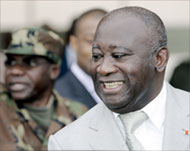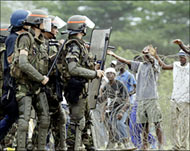UN mulls Ivory Coast sanctions
The Security Council has edged closer to sanctioning individuals blamed for last week’s anti-UN violence in Ivory Coast.

The movement came on Thursday as the UN mission in the Ivory Coast began a temporary evacuation of some civilian staff.
“No decision has been taken today but I think we are very close to a decision (on sanctions),” Jean-Marc de La Sabliere, France’s UN envoy, said after the council was briefed on the situation by the UN special representative for Ivory Coast, Pierre Schori.
“All members who took the floor today very strongly condemned the attacks against UN forces,” de La Sabliere said.
“It is not acceptable that the UN forces be attacked by those who do not want to implement the roadmap” [due to lead to free and fair elections by 31 October].
Balanced sanctions
The French envoy, whose country is Ivory Coast‘s former colonial ruler, said the 15-member council favoured targeted and “balanced” sanctions against Ivorian pro-government and rebel personalities responsible for violence.
He said a decision was likely to be made in the coming days. The council’s sanctions committee chaired by Adamantios Vassilakis, Greece‘s UN envoy, has been meeting this week to finalise details of the sanctions, likely to include an asset freeze and a travel ban.
 |
|
Gbagbo’s government has been |
The four-day violence by nationalist backers of Laurent Gbagbo, the president, targeting UN facilities erupted after a UN-mandated international working group recommended the Ivorian parliament stand down because its five-year term had ended.
The move to end the parliament’s mandate and give some key members other jobs was seen as a bid to strengthen the hand of Charles Konan Banny, the interim prime minister, and speed up the peace process without constant hitches after three years of near deadlock.
Schori stressed the need to end impunity for those behind the disturbances.
“I don’t want this to happen again and I want those behind this to be punished,” he noted.
He said UN forces were not adequately equipped to handle the rioting. “We need a quick-reaction force, riot police. We have three armoured vehicles in the whole of Abidjan (Ivory Coast‘s economic capital),” he noted.
Temporary relocation
Meanwhile the UN mission in Ivory Coast began what Schori called a “temporary relocation” of some its civilian personnel outside the country.
 |
|
The UN contingent is backed by |
UN officials said about 200 personnel, including civilian police, were leaving Abidjan on two special flights for Banjul, Gambia, where they will be stationed for some weeks.
On Tuesday the Security Council extended until 15 December the mandate of 7000-strong UN mission in Ivory Coast and of the 4000 French troops backing them, but made no decision on a request for an increase of the force.
Schori made it clear the extra troops were needed to provide security across the country and to secure the election process.
Ivory Coast, the world’s leading cocoa producer and once one of Africa’s most prosperous and stable states, has been split since fighting broke out in 2002 between Gbagbo’s government and rebels who control the mostly Muslim north of the country.